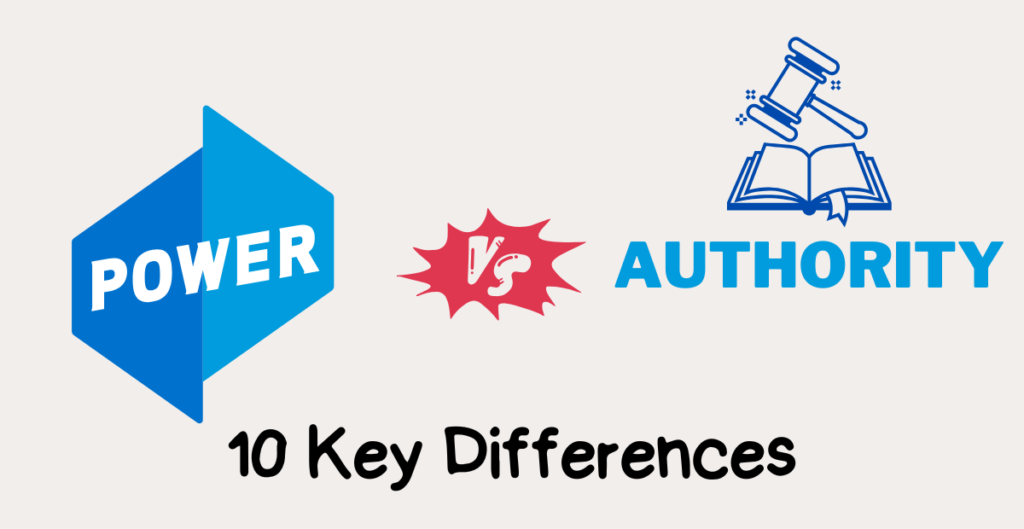In politics and leadership, people often mix up “power” and “authority,” but they mean different things. Knowing the differences between power and authority helps us understand how leaders and government’s function.
This article will explain what power and authority are, their main features, and how they differ. By the end, you will have a clear understanding of why authority is generally more stable than power and how both play important roles in society.
What is Power?
Power is the ability to influence or control others, whether or not it is legally or morally right. It can come from different sources like physical strength, money, knowledge, or status. Power can be used positively, like inspiring others, or negatively, like forcing people to obey. It does not always require consent from the people being influenced, and it can sometimes be unstable.
Key Features of Power
- Can be used with or without permission
- It doesn’t always have legal or moral backing
- Can belong to individuals or institutions
- Can be gained through force, persuasion, or influence
- It can change quickly and is often unstable
Types of Power
Power is not a one-size-fits-all concept. Scholars have identified different types of power that affect how it is used and perceived:
- Coercive Power – Based on fear, force, or threats.
- Reward Power – Comes from the ability to give incentives or rewards.
- Legitimate Power – Stems from a recognized position or title.
- Expert Power – Derived from knowledge or expertise in a particular area.
- Referent Power – Based on admiration or respect for a person.
Examples of Power
- A dictator forcing strict rules
- A manager influencing employees
- A rich person affects political decisions
- A celebrity influencing social trends
- A gang leader controlling a neighborhood
What is Authority?
Authority is the official right to make decisions and enforce rules. It comes from laws, traditions, or widely accepted social norms. Unlike power, authority is recognized by people and tends to be stable. When a person or institution has authority, others generally follow their decisions willingly because they recognize their right to lead or make rules.
Key Features of Authority:
- Comes from laws, traditions, or social norms
- Accepted and recognized by society
- Creates stable leadership and governance
- Usually leads to voluntary compliance
- Exists in governments, organizations, and institutions
Types of Authority:
Like power, authority can also take different forms:
- Traditional Authority – Based on customs and long-standing practices (e.g., monarchies, tribal leaders).
- Legal-Rational Authority – Based on legal rules and laws (e.g., government officials, judges).
- Charismatic Authority – Based on personal qualities and leadership skills (e.g., revolutionary leaders, religious figures).
Examples of Authority:
- A judge making legal decisions
- A teacher setting classroom rules (
- A government official enforcing policies
- A police officer directing traffic
- A principal managing a school
Must Read- Political Sociology: Understanding Its Meaning, Nature, and Scope
10 Key Differences Between Power and Authority
| Factor | Power | Authority |
|---|---|---|
| Definition | The ability to influence or control others. | The legal or accepted right to lead. |
| Legitimacy | May or may not be legal or accepted. | Always based on laws or social approval. |
| Source | Can come from wealth, knowledge, or force. | Comes from legal rules or traditions. |
| Consent | Can be forced upon people. | Requires acceptance by society. |
| Stability | Can change or disappear quickly. | More stable and lasts longer. |
| Nature | Can be informal and personal. | Always official and structured. |
| Use | Can be used for good or bad reasons. | Used within legal and ethical limits. |
| Scope | Can be unlimited and unpredictable. | Limited by laws and roles. |
| Example in Politics | A rebel group taking over a country. | An elected president leading a nation. |
| Public Reaction | May face resistance. | Generally accepted and followed. |
Must Read- Political Science vs International Relations: 10 Key Differences Explained
Differences Between Power and Authority in Detail
- Power Can Exist Without Authority: A person or group may have power without any official recognition, such as a criminal gang controlling a neighborhood. In contrast, authority always involves recognized legitimacy.
- Authority Creates Stability: While power can be temporary and unstable, authority provides a stable framework for governance and leadership.
- Authority Requires Social Acceptance: Authority is granted by society through laws and traditions, whereas power can be taken by force or manipulation.
- Power Can Be Abused More Easily: Since power does not always require legitimacy, it is more prone to misuse, unlike authority, which is bound by laws and ethics.
- Both Can Influence Society: While power can create rapid change, authority ensures long-term stability in leadership and governance.
- Authority is Institutionalized: Authority is often embedded within institutions, making it more structured, while power can be informal and unpredictable.
- Power May Be Temporary: A powerful leader may lose influence over time, while authority is more enduring due to its legal or traditional foundations.
- Authority Encourages Order: Since authority operates within legal and ethical guidelines, it promotes social order and organization, while power alone may lead to chaos.
- Power Can Exist in Any Setting: Power can be seen in informal social groups, businesses, or criminal organizations, while authority is usually tied to official positions.
- Authority Often Commands Respect: People are more likely to comply with authority voluntarily, whereas power may require enforcement or coercion.
How do Power and Authority Work Together?
Even though power and authority are different, they often work together. A person with authority, like a president or a police officer, also has power. However, someone with power, like a criminal or a dictator, may not have legitimate authority. Ideally, societies function best when power is supported by legitimate authority, ensuring stability and fairness.
For example:
- A government official has both power (to enforce laws) and authority (because they were elected or appointed legally).
- A business leader has authority within their company, but their power depends on their influence over employees and stakeholders.
- A teacher has authority in the classroom, but their power depends on how well they manage students.
Conclusion
Understanding the differences between power and authority is important in politics and leadership. Power is about influence, while authority is about legally recognized leadership. Power can be temporary and sometimes unfair, while authority is stable and accepted. Both play key roles in politics, organizations, and everyday life. Recognizing these differences helps us understand leadership and governance better.
In a well-functioning society, authority should be used responsibly to maintain order and fairness, while power should be exercised ethically to create positive change. Studying power and authority helps us become more informed citizens, capable of analyzing the world around us and understanding the forces that shape our lives.
Frequently Asked Questions (FAQs)
Q1: Can someone have authority without power?
Yes, a person may have authority but lack power if they cannot enforce their decisions effectively.
Q2: Is power always bad?
No, power can be used positively, such as inspiring change, leading reforms, or motivating people.
Q3: Can authority be lost?
Yes, authority can be lost if people stop recognizing its legitimacy, such as during a revolution or political upheaval.
Q4: Why is authority more stable than power?
Authority is backed by laws and traditions, making it more enduring, while power can change quickly.
Q5: Can a leader have both power and authority?
Yes, effective leaders often have both, using power within the limits of their authority to govern successfully.
References
Weber, M. (1947). The Theory of Social and Economic Organization. Translated by A. M. Henderson & T. Parsons. Free Press.
Dahl, R. A. (1957). The Concept of Power. Behavioral Science, 2(3), 201-215.
French, J. R., & Raven, B. (1959). The Bases of Social Power. In D. Cartwright (Ed.), Studies in Social Power (pp. 150-167). Ann Arbor, MI: Institute for Social Research.
Lukes, S. (2005). Power: A Radical View (2nd ed.). Palgrave Macmillan.
let me share with you that you have learned from “10 Key Differences Between Power and Authority “


Comments are closed.